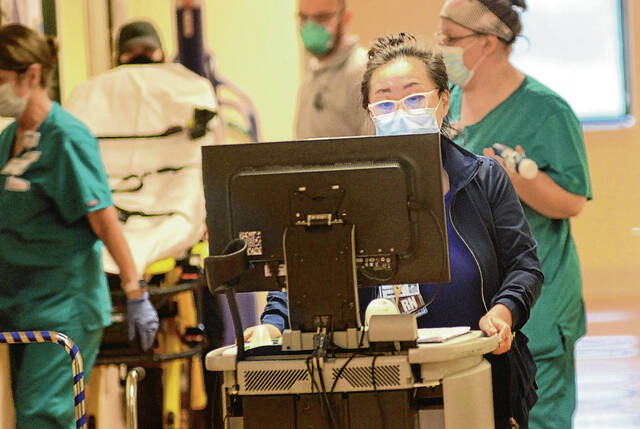
Joel Philippsen | CRH Photo Columbus Regional Health Registered Nurse Aeran Pearson uses a computer to chart in the hallway after leaving a patient room on the 5 Tower floor at Columbus Regional Hospital Thursday afternoon, Dec. 16, 2021.
Columbus Regional Health says an “unrelenting surge” in hospitalizations and emergency room visits over the past few days and weeks has driven the overall hospital census to match its all-time high, placing in “jeopardy” the space and resources needed for patients with unavoidable medical emergencies or accidents.
CRH reported a total of 198 hospitalizations Wednesday — including 52 people with COVID-19 — which tied for the highest total census in the hospital’s 104-year history, officials said. CRH has set inpatient census records several times as of late. About 80% of COVID-19 patients at CRH — or 4 in 5 — are unvaccinated.
On Thursday, CRH officials said frontline health care workers “are reaching a breaking point” and fear that things will only get worse in the coming weeks.
CRH is pleading with the 30,700 eligible-but-still-unvaccinated Bartholomew County residents to get their COVID-19 shots, and those who are eligible, to get their booster shot. Additionally, the hospital system is urging people to “have compassion and concern for your neighbor,” wear masks in public settings and gatherings, stay home if you are not feeling well except to seek medical care and get tested, adding, “We need your help.”
“The collective strain being placed on the healthcare systems and medical professionals in our area has immediate and distressing implications to medical services and hospital access to all the patients and communities we serve,” the CRH staff said in a statement Thursday. “At this critical time, every bed counts.”
Despite the record-high inpatient census, the hospital system is still encouraging people to seek medical care if they need it and call 911 if they are experiencing a life-threatening emergency.
“Staff will be there to care for you,” hospital officials said.
The dire warning from the local hospital system came one day after Gov. Eric Holcomb and state health officials painted a grim picture of the current state of the pandemic, warning that they expect a “very steep rise” in COVID-19 cases in coming weeks as the omicron variant converges with an ongoing delta surge.
The number of Hoosiers hospitalized with COVID-19 has reached its highest level in a year, and the overall hospital census in Indiana is at its highest level in five years, officials said. Just 9.2% of the state’s ICU beds were available Wednesday, the fewest available so far during the pandemic, according to the Indiana Department of Health.
Patients are being held in the emergency room for hours and sometimes days until a bed becomes available, officials said. Others are being cared for in hallways and conference rooms.
Indiana also is experiencing a shortage of rapid tests that has led to a 78% decrease in the weekly supply that state testing facilities have as people line up at some testing sites an hour before they open, officials said.
The situation is so grim that state health officials said Wednesday, “It does seem a little like there’s some deja vu here with what we experienced at the very beginning of the pandemic.”
“We once again are facing a very bleak situation with this pandemic,” Indiana State Health Commissioner Dr. Kristina Box told reporters on Wednesday. “…This situation will get worse before it improves.”
Earlier this week, new cases of COVID-19 in the U.S. soared to their highest level on record at over 265,000 per day on average, a surge driven largely by the highly contagious omicron variant, The Associated Press reported.
New cases per day have more than doubled over the past two weeks, eclipsing the old mark of 250,000, set in mid-January, according to data kept by Johns Hopkins University.
Locally, CRH is bracing for what may lie ahead.
“With the omicron variant of the virus bearing down, we anticipate this surge could worsen and we do not have a clear vision of when things will improve,” CRH said.




